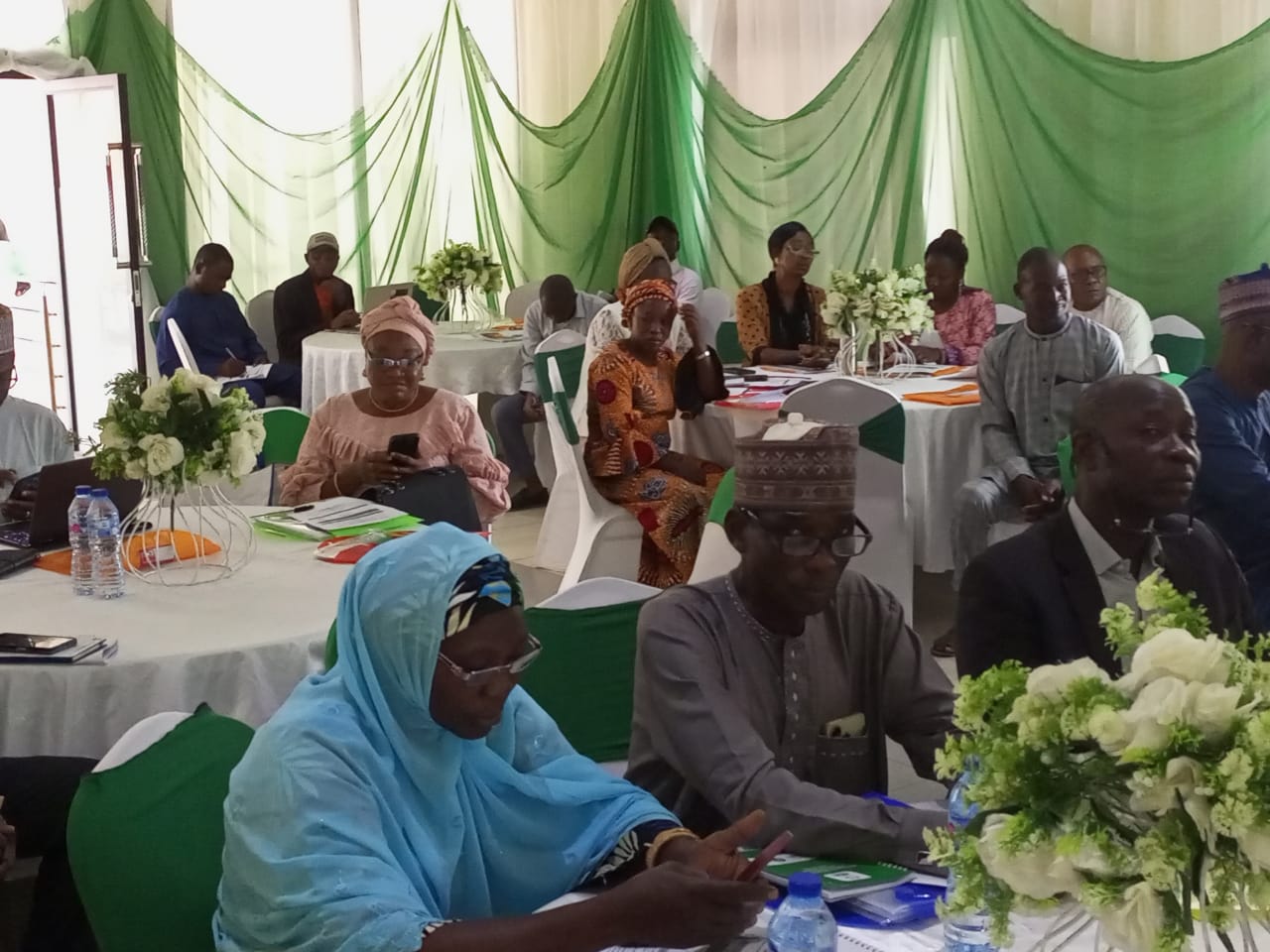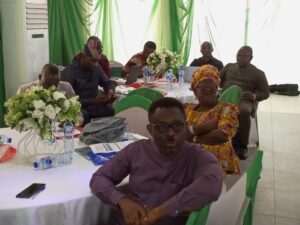
Reported by Joseph Paul
On Wednesday, 22 Novemer 2023, the Climate and Sustainable Development Network (CSDevNet) participated in a one-day advocacy workshop on Ramping up Access to Climate Information Services for National Development and Food Security in Nigeria, organised by the Nigerian Meteorological Agency (NiMET) and the Human and Environmental Development Agenda (HEDA) Resource Center at the NAF Conference Center.
The workshop brought together nearly a hundred senior government officials, legislators, MDAs, higher institutions, research institutions, farmers, civil society, community representatives, women, young people, and the media, among others, with the discussions centering on strengthening climate information service delivery in the country in order to build resilience in Nigeria’s agriculture and food systems.
The Meeting provided the opportunity for participants to learn and understand climate change and agriculture, as well as access to climate information services to boost agricultural production and address food insecurity.
Sulaimon Arigbabu, Executive Secretary of HEDA, delivered the first welcoming remarks as he appreciated the presence of Sen. Seriake Dickson, commending his committed to climate action.
“Access to climate change information is at the heart of tackling hunger and food security in Nigeria. With Access to reliable and timely climate information, we can reduce the loss of lives, crops and improved food security in Nigeria,” he said.
“The purpose of the event is to look at the impact of climate change on our community, on farmers and to proffer solutions for a sustainable future of Nigeria,” he added.
Similarly, Prof. Emmanuel Ike Ikani, Director General (DG) of the National Agricultural Extension Research and Liason Service (NAERLS), in his goodwill message emphasised the need for more stakeholder committed to practically address climate issues.
Dr. Haliu Ali Usman, DG of National Agricultural Seed Council, (NASC) emphasised the pressing issue of climate change as it affects food security and stated that his organisation is open for collaboration to foster sustainable agricultural practices in Nigeria.
Sen. Seriake Dickson, Chairman of Senate Committee on Climate Change and Ecology, in his remarks encouraged collaboration and partnerships for climate advocacy.
“I am honored to be part of this interaction. The notion of climate change and degradation of our environment are pressing issues on the environment and the globe. The environment is a collective heritage of all mankind, and it is in our duty to protect it and hand it over to those behind us,” he said.
Sen. Seriake encouraged the need for more enlightenment and awareness as most people do not know the nexus between climate change and the impact on agriculture and livelihood.
He restated his commitment to support climate action and advocacy in Nigeria. And, mentioned that his University in Bayelsa, HENSARD University, was ready to partner with organisations to promote climate action for Climate awareness and education.
David Jatau, Commissioner from Nassarawa State, highlighted how challenges of farmers in Nasarawa state experiencing variable rainfall and post-harvest losses could be addressed.
Prof Mansur Bako, DG of Nimet, welcomed participants and stated the importance of the event.
“I’m sure the issue of climate change is no longer just for our children but for us at present as well, because we are already experiencing the challenges that come with climate change. Weather is life and life is weather in Europe, but in developing countries, weather is unknown and life is uncertain,” he said.

During the first presentation on “state of climate information services delivery in Nigeria: addressing challenges and gaps in the value chain,” the DG provided background information showing evidence of climate change, the challenges faced in various communities and activities of NiMET.
He mentioned that some of the gaps and challenges of NiMET was that they employed syndicates due to limited human capital, obsolete technology requiring frequent updates, replication and overlap at the local community level. Additionally, no clear-cut collaboration with local communities, people ignored early warning provide information.
Prof. Mansur introduced the participants to the NiMET App that provided accessible climate information for mobile download, giving a run-down of NiMET activities in weather forecasting.
Dr. Lateef Sanni, Executive Director of the Nigerian Stored Products Research Institute (NSPRI), spoke on community factors to harvest losses such as poor storage and increase in temperature.
He stated that climate information services are important to address these challenges and emphasised the commitment of NSPRI to tackle post-harvest losses.
Dr. Lateef shared the NSPRI’s storage infrastructure facilities initiative and best practices for effective agricultural produce storage that helped address post harvest losses and support local farmers.
Prof. Emmanuel Ike Ikani, DG of NAERLS, added that 45-50% of farm produces are lost to post harvest losses. 80% of Nigerians are still using cutlass and hoes for farming.
“We need to reduce use of cutlass and hoes for farming to accelerate agricultural and value addition in storage, processing and branding. Until we reach out to the policy makers concerning agricultural adaptation, all our efforts will be for nothing,” he said.
Hauwa Ali, Representative of SAHEL Consulting, spoke on efforts geared towards public-private partnership and community involvement at every level. She said, “Understanding the unique needs and climate realities of the community is important in planning.”
Igwu Julius from the Nigeria Hydrological Services Agency (NIHSA), highlighted activities of the NIHSA in the grassroots through stakeholder engagements.
Prof. O. Ottman, Representative of Women Farmers Advancement Network (WOFAN), highlighted the activities of WOFAN in building capacity of women and helping women in Agriculture best practices and sustainability.
In summary, the High-Level Advocacy Workshop highlighted the urgent need for enhanced climate information services to fortify Nigeria’s agricultural sector and ensure food security.
Stakeholders, including government officials and experts, emphasised the importance of collaborative efforts to address climate change challenges.
Recommendations included the collaboration of government agencies, removal of impediments to farmers’ access to information, and increased funding for meteorological services.
Gender-inclusive strategies, all-season farming, and climate-smart agriculture practices were underscored as essential for sustainable solutions.
The workshop concluded with a commitment to ongoing collaboration and advocacy for a resilient and food-secure Nigeria.
